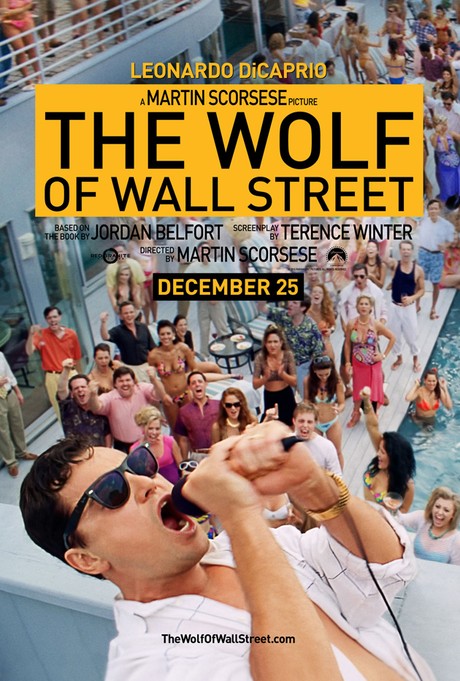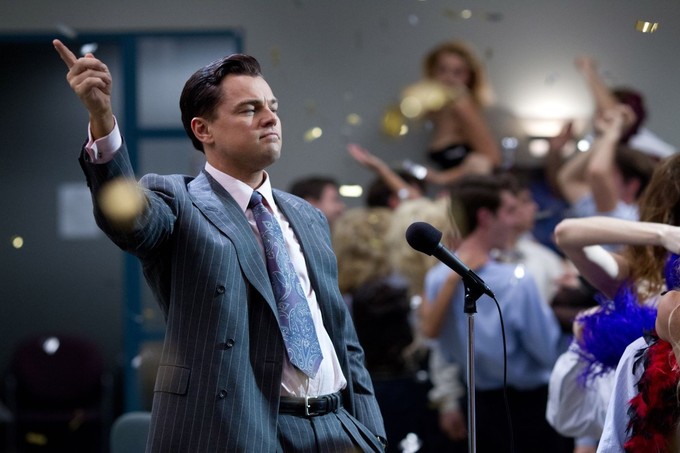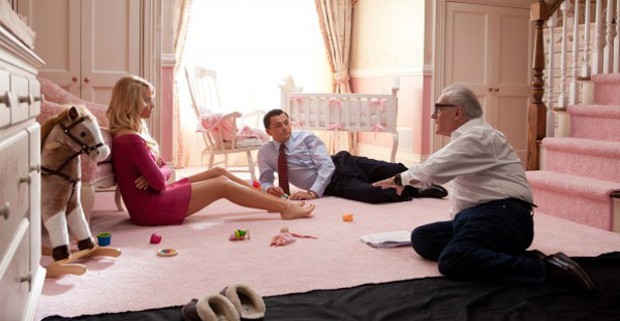Ahoy, squirts! Quint here. I hate doing top ten lists. Hate 'em. Here's the thing, I already feel like I'm constantly wrestling with the line between what's a personal favorite and what's the best made film every year, so when I have posted top ten lists I always feel like I'm betraying one for the other. The way I've combated that feeling recently is by putting together a blanket favorite films of the year list, which could be 5 movies or 25. The only condition I put on that list is that the films chosen be ones I know I'll revisit over the coming years.
When I put together a list of my favorite 2013 films The Wolf of Wall Street will be at the top. It's the best of both worlds, a film so amazingly well constructed that only a master filmmaker like Martin Scorsese could be behind it, but it's also so goddamn funny that the rewatch factor is going to be crazy, much like Scorsese's other similarly toned films like After Hours and Goodfellas.
You can imagine I was extremely happy to have the chance to talk with the film's writer, Terence Winter, while he was making the rounds promoting the film. Winter has previously collaborated with Scorsese on Boardwalk Empire and played a big part in bringing The Sopranos to your TV, so his bonafides are already solid, but his work on The Wolf of Wall Street takes his career to another level as far as I'm concerned.
We talk a bit about how the collaborative process is when working with a legend like Scorsese, but the main focus is on a key sequence involving quaaludes and Jonah Hill having trouble swallowing a piece of ham... and Popeye's involved. I know that doesn't make any sense if you haven't seen the movie, but trust me if your sense of humor is anything like mine you'll count this sequence as one of your favorites of the year.
Enjoy!

Quint: How's it going? Sounds like you're a little busy today.
Terence Winter: Yeah, a little busy, but you know you never get tired talking about your movie project with Marty Scorsese. I never thought I'd actually be able to speak that sentence, so I could do this forever.
Quint: Well, you'll at least be doing it for another 10 minutes if I have anything to say about it. I got to see the movie at my boss's 24 hour film festival, Butt-Numb-A-Thon. It was actually kind of bad programming on Harry's part because the movie was first up and all 11 other films that came after had to follow it up.
Terence Winter: Oh, wow. Thanks, man. That's cool.
Quint: It immediately became one of my favorite movies of the year and I'm really excited to talk to you about it.
Terence Winter: That's really flattering, thank you.
Quint: One of my favorite moments in any movie this year, and there have been a lot of good movies this year, was the Popeye moment in The Wolf of Wall Street.
Terence Winter: You know, that's one of the things I'm most proud of. It occurred to me during a conversation with Marty. We were talking about that whole scene and I said, “Leo grabs the coke and he snorts it, kind of like Popeye.” I stopped and said, “What if Popeye is the inspiration for that? What if it's on TV?” I think it works so well. I'm sure the creators of Popeye didn't know that one day their cartoon would be used in such a way, but you know what? It worked great and we're really proud of it.
Quint: What's funny is that Harry hadn't seen the movie until BNAT, but he had coincidentally programmed Robert Altman's Popeye to play four or five movies after Wolf of Wall Street.
Terence Winter: That's great!
Quint: So when that movie played and the spinach stuff came up the audience lost it.
Terence Winter: You kind of look at it a little differently now.
Quint: That whole quaalude sequence is indicative of the amazing tone you guys were able to set throughout the whole movie. It's obviously a drama, but it's so crazy and funny throughout... can you talk a little bit about how you captured that tone in the writing process?
Terence Winter: So much of it is in the book, which is so raw and Jordan (Belfort) is so unbelievably forthcoming with stuff that you can't believe A, that a person could experience all of it and live to tell about and B, admit to it! When you read this stuff you go, “oh, God! He's actually telling you the real story of behavior you just can't imagine anyone going through!”
The tone of the book was just really out there and really honest and I knew it was just an incredible rollercoaster ride and I wanted to capture that spirit throughout the whole thing. The big challenge in writing it is the story is so massive. If we did a direct adaptation of the book the movie would be 18 hours long, so I had to get my arms around the material, kind of truncate it and collapse the timeline a little bit, combine characters and that kind of stuff. But once I got the handle of it and followed the rise and fall of Jordan Belfort it was easier to then say “these are the movie moments in the book that I have to have in the movie.” I made a list of the scenes I had to have in the movie, that were too good to pass up, put it into the right framework and just sort of went for it.
The quaalude scene particularly I knew was going to be a really special sequence. Originally, in the first draft, the scene where Donnie chokes on the ham, that part of it actually took place in a completely different scene. During the course of pre-production Marty, Leo and I were talking about the tone and pacing and keeping up that crazy energy... for production reasons, too... we were trying to figure out some scheduling stuff and thought, “If we took the ending of that other scene...” which originally took place at a swimming pool, Donnie choking on the ham, “what if we took that and put that on the end of the quaalude scene?” That's how that whole sequence was born. Marty said, “Why don't you go off and try it that way and let's see what we have.”
So, I rewrote it and called him up and said “I think this is ten times better. I think this really works.” We read it aloud, Marty, Leo and I and were laughing our asses off. It's funny, when my wife read that sequence in the script she was feeding our infant son and was laughing so hard she almost dropped him! She was howling, crying. When I finally saw the movie, I saw it before she did, I called her up and said, “If you think the script was funny wait until you see this actually play out in front of you. You will not believe the level to which Leo and Jonah commit to this.” It's unfuckingbelievable how much they go for it and it's all up there on the screen.
Quint: Not to keep focusing only that one scene, but it's amazing to me that there's almost a three act structure to that one sequence...
Terence Winter: Yeah, it's a little mini-movie within a movie.
Quint: I'm not too familiar with the early development of this picture, but it sounds like Leonardo Dicaprio was involved early on. Is that the case? Were you able to write Jordan with him in mind?
Terence Winter: Yeah, Leo optioned it and took it to Marty. Marty was onboard and I flew to New York, I was living in LA at the time, I flew to New York, met with them and my one question early on was whether or not Marty would give me the license to write this using voiceover.
Part of the fun of the book is Jordan's voice and his way of looking at the world is so unique. He would do these asides, you know ball-breaky stuff about certain people and stuff like the three stages of being high and the five different types of hookers or whatever. It's stuff that didn't necessarily lend itself to dialogue, but was entertaining and funny and I wanted it in the movie.
So, I asked Marty if he would be okay if I wrote this with voiceover. I thought he might be sensitive to that for better or worse because of Goodfellas and Casino and, to a certain extent, Mean Streets had that device. He said, “No, let's absolutely make this a companion piece to Goodfellas.” Once I had that blessing I went off and wrote it like that. I also had the luxury of having Leo's voice in my head and knowing Marty's style. Trying to anticipate things he would like and not like was a huge benefit while writing.
Quint: Do you find it easier to write when you know the actor who will be speaking the lines? Can you hear the dialogue better that way?
Terence Winter: Yes, it is easier when I can write and in my head I imagine what Leonardo DiCaprio is going to sound like, but then I see him doing it and he's so much better at being Leonardo DiCaprio than I am! (laughs) I'll read these things aloud and go, “Yeah, that's pretty good,” and then I'll watch Leo do it and go “Holy shit, this guy is fucking great.” He really knocked it out of the park. There are speeches in the script that go on for three solid pages of single-spaced dialogue and he just gets up there and rips for 7-8 minutes at a time. It's just incredible.

Quint: What's great about DiCaprio is he can play both showy like in the quaalude scene or subtle, like in the scene with Kyle Chandler on the boat.
Terence Winter: Right. There's not anything I've seen so far that Leo can't do.
Quint: We touched a little on your collaboration with Scorsese, but I'm always curious about the relationship between a writer and a director and I'm doubly curious when the director is Martin Scorsese. It sounds like he was pretty accessible during the writing process.
Terence Winter: I had a relationship with Marty from the last four years of Boardwalk Empire, so I know him pretty well. We've spoken a lot. I'm very in sync with his creative instincts, what he likes and what he doesn't like having gone through 48 hours of Boardwalk Empire. I've listened to his thoughts on editing, notes and all that stuff, so I had a big advantage going into this.
He's an incredible collaborator and he has been from the minute I met him. He's incredibly warm and funny and interested in what you think. He's a writer himself and, obviously, a master storyteller so he just understands the process and what you're going through as a writer, what the challenges are. He was great from the beginning and had an incredible willingness to try new things. You never know where the magic will be in something and he was always willing to say “Let's try that and see what happens.” I really had a lot of license to create these things and also to screw up, to go a down a road and go “This isn't really working, so let's rethink this.”
When I met him, he was one of my idols and certainly was the reason that I got into this business in the first place, so I was really hoping that he was going to be the great guy I thought he would be. He was exactly what I hoped he would be. He's this really funny, collaborative, charming New York guy who happens to be one of the gods of cinema.
Quint: That's a great place to end on. Thanks for your time and for contributing to another great Scorsese crazy fun movie. I love After Hours and am a huge fan when he dips into the comedic.
Terence Winter: Me, too. Thank you. It was one of the great privileges of my life, so thanks so much. I'm glad you liked it.

There you have it. The movie hits screens Christmas, so if you have cool parents you know what to hit up this holiday season!
-Eric Vespe
”Quint”
quint@aintitcool.com
Follow Me On Twitter

